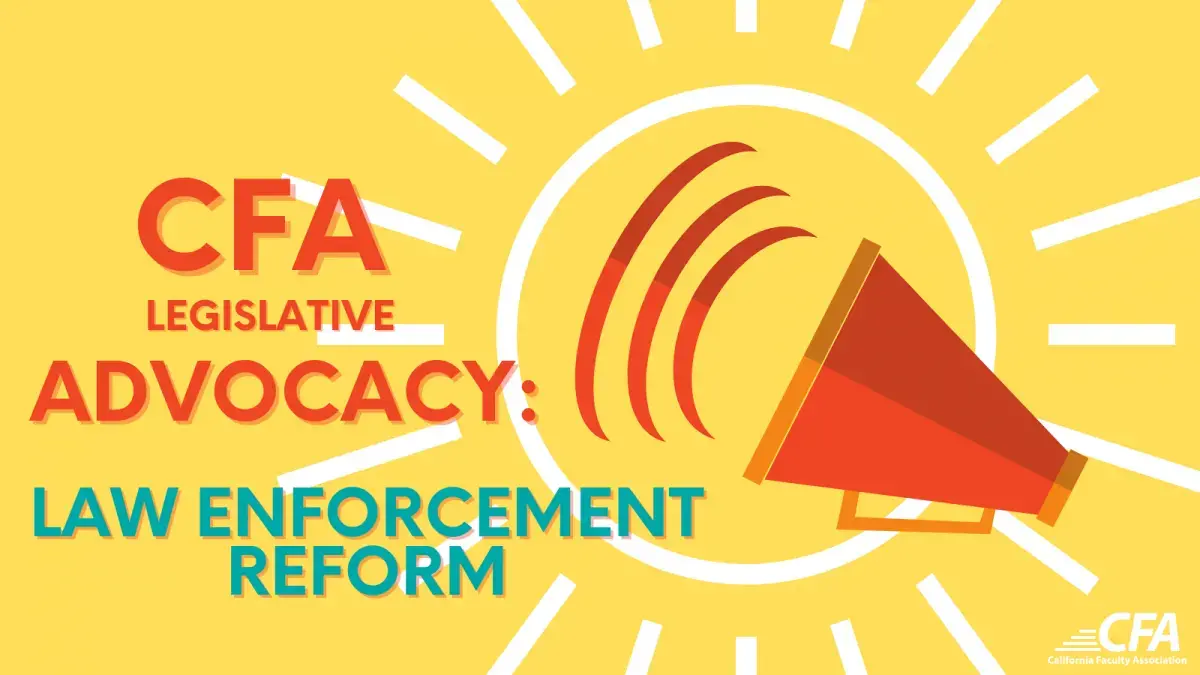nCFA Supports Law Enforcement Reform Bills
Throughout the coming weeks, CFA will introduce members to various proposed legislation that CFA either supports or is closely watching.
As a Minneapolis jury considers holding a police officer accountable for the murder of George Floyd, this week’s item focuses on CFA’s legislative efforts to reform law enforcement. These bills protect our faculty’s and students’ right to protest and look to reform known systemic policing issues in our state.

“In line with CFA’s principles concerning racial and social justice, we advocate for legislation that will reform law enforcement,” said Steven Filling, CFA Political Action and Legislative chair. “The following bills address systemic issues of police misconduct, militarization and lack of transparency. CFA is pleased to work in concert with legislators committed to building a more just, more equitable, safer for all society.”
Two weeks ago, we unveiled our support and sponsorship of bills aligning with our anti-racism and social justice work. Previously, we reviewed bills that protect and strengthen higher education and enhance student access. These bills received input from chapters, and were recommended by CFA’s Political Action and Legislative Committee and approved by the CFA Board of Directors.
Unless specifically noted, CFA supports these legislative efforts:
Assembly Bill 48: CFA is the sponsor on this bill that prohibits any law enforcement agency from using kinetic projectiles (rubber bullets, beanbags, and foam rounds), chemical agents (pepper balls and spray), and tear gas to disperse any peaceful assembly, protest, or demonstration. Last week, AB 48 passed out of the Assembly Public Safety Committee, and moves to the Assembly Appropriations Committee.
AB 60: disqualifies a person from being employed as a peace officer if that person has been convicted of, or has been adjudicated by a military tribunal as, having committed an offense that would have been a felony if committed in California.
AB 89: CFA is a co-sponsor of this bill. Also known as the PEACE Act, the bill establishes and requires a bachelor’s or advanced degree from an accredited college or university and raises the minimum age from 18 to 25 for law enforcement officers.
AB 481: compels police departments to be approved by local governments before buying or receiving funds to buy military equipment like armored cars and unmanned aircraft.
AB 594: requires initial use-of-force investigations to be led by a neighboring law enforcement agency or multi-agency task force.
AB 603: requires municipalities publicly post financial details of their law enforcement use-of-force settlements annually, providing greater transparency on how much each city, county, and the state spends on police abuse settlements with taxpayer dollars.
AB 655: CFA is a co-sponsor of this bill. This bill, following the Jan. 6 attacks on the U.S. Capitol, would weed out extremists in law enforcement, like those associated with 3 Percenters, Proud Boys, KKK, and/or QAnon. The FBI has warned that these groups have infiltrated law enforcement.
AB 759: moves elections for county sheriffs to presidential general election years, beginning Jan. 1, 2024.
Senate Bill 16: expands and strengthens public access to police records. The bill opens up records of officers who have engaged in biased or discriminatory behavior, conducted unlawful arrests or searches, or used force that is excessive or unreasonable. It also disallows officers with a history of misconduct from quitting their jobs, keeping their records a secret, and just moving on to another jurisdiction.
SB 271: CFA is a co-sponsor of this bill. Also known as the Sheriff Democracy and Diversity Act, the bill allows all registered voters to run for sheriff, modifying eligibility requirements, and reverting back to the eligibility requirements in place in the state from 1850 to 1989.
SB 493: requires at least 95 percent of Juvenile Justice Crime Prevention Act (JJCPA) funding to be invested in non-law enforcement public agencies and/or community-based organizations. With the bill, councils that oversee JJCPA grants locally must include at least 50 percent community representation.
Join California Faculty Association
Join thousands of instructional faculty, librarians, counselors, and coaches to protect academic freedom, faculty rights, safe workplaces, higher education, student learning, and fight for racial and social justice.